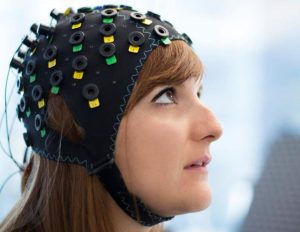Improve the Brains Ability to Directly Control Computers with Mindfulness
By John M. de Castro, Ph.D.
“Meditation has been widely practiced for well-being and improving health,” said He. Our work demonstrates that it can also enhance a person’s mental power for mind control, and may facilitate broad use of noninvasive brain-computer interface technology.” – Bin He
It has long been a dream to develop methods to allow the brain to directly alter external devices. The efforts have been focused on developing a brain-computer interface such that recorded electrical activity of the brain is interfaced with a computer allowing control of the computer by the activity. It is hypothesized that a brain computer interface might be able to provide an alternative method to control muscles in patients with severe neuromuscular diseases.
Brain-computer interface methods have been developed but suffer from long training times before the participant is capable of affecting the computer activity. Meditation has been shown to alter the activity of the brain. Meditation training may make the individual better at controlling their brain activity. Hence, an interesting research question is to investigate whether meditation training will improve the ability to learn to control a computer with the brain’s electrical activity.
In today’s Research News article “Frontolimbic alpha activity tracks intentional rest BCI control improvement through mindfulness meditation.” (See summary below or view the full text of the study at: https://www.ncbi.nlm.nih.gov/pmc/articles/PMC7994299/ ) Jiang and colleagues recruited healthy adults without brain-computer interface experience and randomly assigned them to a wait-list control condition or to receive 8 weeks of Mindfulness-Based Stress Reduction (MBSR) program. After training they all participated in 6 or 10 weekly, 1-hour, brain-computer interface training sessions. Their brain electrical activity was recorded with an electroencephalogram (EEG). The electrical activity occurring in the motor cortex was connected to a computer which moved a cursor over the screen. The participants were asked to try to move the cursor left or right by imagining opening and closing the left or right hand, to move the cursor up by imagining opening and closing both hands and down by resting.
They found that compared to the wait-list control group the Mindfulness-Based Stress Reduction (MBSR) group had significantly greater improvement in the brain-computer interface task over sessions. They also found that the MBSR group had significantly greater alpha rhythm (8-12 hz. in the EEG) power in the frontal and limbic regions of the brain. They also found that over training there was decreased frontolimbic connectivity in the MBSR group while the wait-list control group had greater connectivity. Finally, the greater the increase in alpha rhythm power in the MBSR group, the greater the increase in the brain-computer interface task performance over sessions.
These results suggest that mindfulness training improves the individual’s ability to learn to control a computer with brain activity. Underlying this improved performance appears to be changes in the electrical activity of the brain at rest and during task performance. Mindfulness training is known to improve attention and reduce mind wandering. This may be how mindfulness training improves the individual’s ability to learn to control the computer with brain activity. It remains for future research to investigate this possibility.
So, improve the brains ability to directly control computers with mindfulness.
“the emphasis on present-moment experience may allow expert meditators to self-regulate brain activity which could translate into enhanced [Brain-Computer Interface] control. Self-regulation supported by attentional control, emotional control, and self-awareness may additionally help users aim at a state of effortless relaxation, which has been hypothesized to improve [Brain-Computer Interface] control.” – James R. Stieger
CMCS – Center for Mindfulness and Contemplative Studies
This and other Contemplative Studies posts are also available on Google+ https://plus.google.com/106784388191201299496/posts and on Twitter @MindfulResearch
Study Summary
Jiang, H., Stieger, J., Kreitzer, M. J., Engel, S., & He, B. (2021). Frontolimbic alpha activity tracks intentional rest BCI control improvement through mindfulness meditation. Scientific reports, 11(1), 6818. https://doi.org/10.1038/s41598-021-86215-0
Abstract
Brain–computer interfaces (BCIs) are capable of translating human intentions into signals controlling an external device to assist patients with severe neuromuscular disorders. Prior work has demonstrated that participants with mindfulness meditation experience evince improved BCI performance, but the underlying neural mechanisms remain unclear. Here, we conducted a large-scale longitudinal intervention study by training participants in mindfulness-based stress reduction (MBSR; a standardized mind–body awareness training intervention), and investigated whether and how short-term MBSR affected sensorimotor rhythm (SMR)-based BCI performance. We hypothesize that MBSR training improves BCI performance by reducing mind wandering and enhancing self-awareness during the intentional rest BCI control, which would mainly be reflected by modulations of default-mode network and limbic network activity. We found that MBSR training significantly improved BCI performance compared to controls and these behavioral enhancements were accompanied by increased frontolimbic alpha activity (9–15 Hz) and decreased alpha connectivity among limbic network, frontoparietal network, and default-mode network. Furthermore, the modulations of frontolimbic alpha activity were positively correlated with the duration of meditation experience and the extent of BCI performance improvement. Overall, these data suggest that mindfulness allows participant to reach a state where they can modulate frontolimbic alpha power and improve BCI performance for SMR-based BCI control.
https://www.ncbi.nlm.nih.gov/pmc/articles/PMC7994299/
